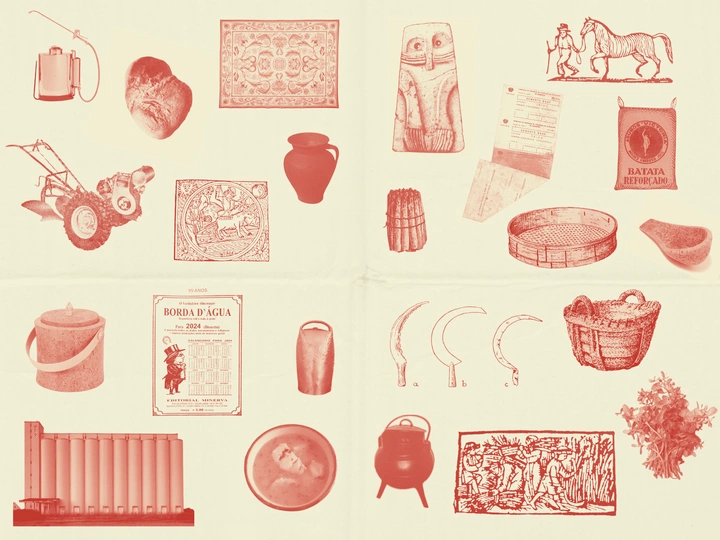Pousio/Fallow – a situated vocabulary for degrowth

Mariana Martins de Oliveira
Miguel Teodoro
Comprising a multidisciplinary team, "Pousio" is committed to reconnecting agricultural, craft, and food knowledge to the landscape, using culinary arts, visual storytelling, sustainable fashion, and climate activism:
Mariana Martins de Oliveira (1995) is a multidisciplinary artist and educator who explores food cultures and social practices to consider on contemporary times and the individual's role in creativity, ecology, and community. She has extensive experience in education, working on pedagogical projects at various art institutions nationwide. Currently, she collaborates with The Gramounce and co-hosts the Trash-Club Porto. Having bread as a primary focus, she investigates the foundations of Alentejo’s diet and how it shaped the territory and its memories.
Miguel Teodoro (1997) is a visual artist, designer, and self-taught farmer-forager. He works toward merging his artistic and land-oriented practices into the same body of work, examining the interdependencies of materiality, ecology and visual culture through site-responsive and context-specific installations and spatial practices. His most recent body of work “Chemical Affinities” (Cum Laude, Design Academy Eindhoven) examines how the histories of media and visual culture have altered landscapes in the Alentejo region of southern Portugal, with inquiry into the impacts of soil fertility and agro-chemical industries, and the resulting local material and territorial manifestations. Teresa Carvalheira (1991) is a designer and upcycler. She was community manager for the international movement “Fashion Revolution” and producer of the documentary series “É P’ra Amanhã”. She is involved in transdisciplinary projects related to textiles, social innovation and heritage worldwide. Her focus within the collective work lays on expanding the research on the land’s (lost) traditional napping practices, first published (in collaboration with Mariana) on APRIA journal: on “Exhaustion”.
"Pousio" (fallow in english 1. left untilled or unsown after plowing. 2. dormant, inactive.) serves as a research platform and framework in the Alentejo region, delving into its historical nuances and contemporary dynamics through the lens of material artefacts.
In Alentejo, time is valued for its unhurried pace, known as "vagar," which emphasizes rhythm over efficiency. “Pousio” feels the urgency to consider intersectionality and ecological perspectives, in connection to Alentejo’s landscape, artistic structures and politics. Transcending conventional ethnographic and architectural research boundaries, the project aims to construct a decentralised and vibrant archive of the region’s knowledges. By recontextualising artefacts, ranging from forgotten tools, recipes or overlooked architectural structures, it unveils the region’s profound interdependencies between social, environmental, and spatial dynamics.
At its core, “Pousio” serves as a research platform, a space of critical inquiry. It challenges institutionalised ways of looking at material culture, advocating for alternative approaches to tackle the urgent issues that affect the region such as soil exhaustion, monocrop, desertification, and vernacular knowledge loss. Through a storytelling immersion in the material and spatial embedded characteristics of each artefact, the project generates a newly formed toolkit to imagine degrowth and social-ecological restorative practices.
“Pousio” is not merely a scholarly pursuit; it is a call to action, a catalyst for change. It challenges us to confront the silences and omissions ingrained in our understanding of the region. As the project unfolds, it can take diverse formats and scales, from editorial to performative, and discursive public programmes that promise to ignite conversations and synergies with local stakeholders and forge pathways towards a more just and sustainable Alentejo. How can we recenter degrowth in crafting possible alternative futures?